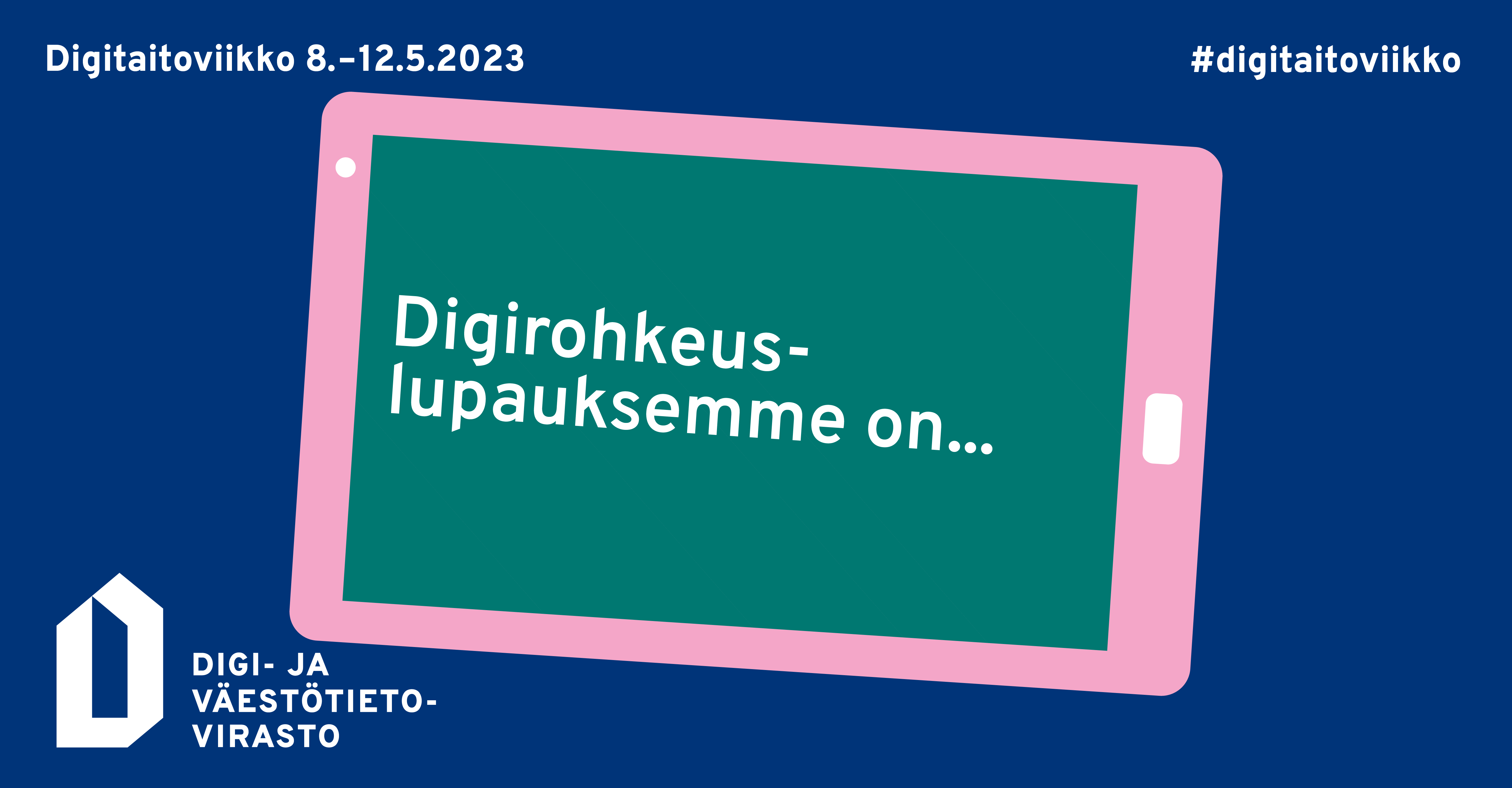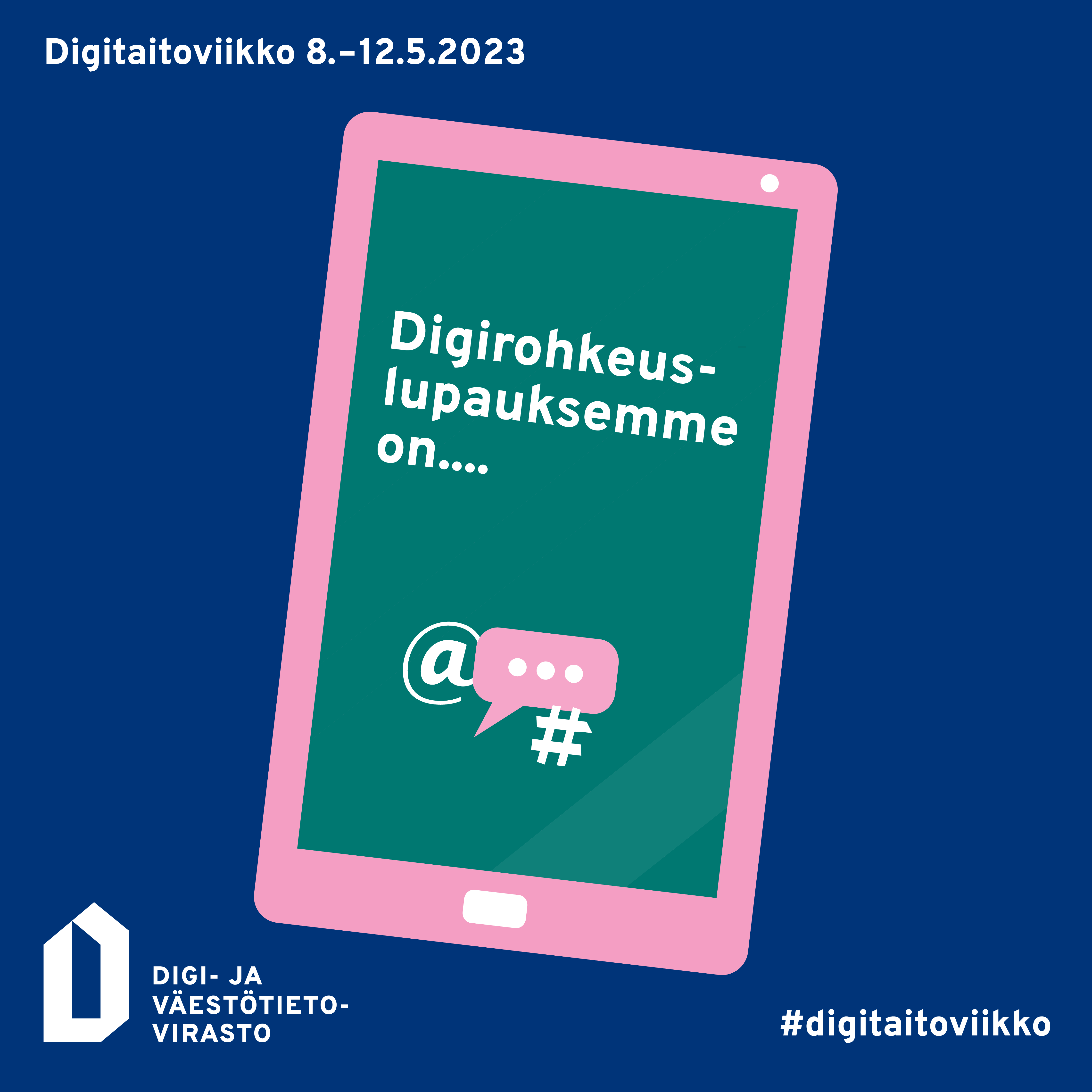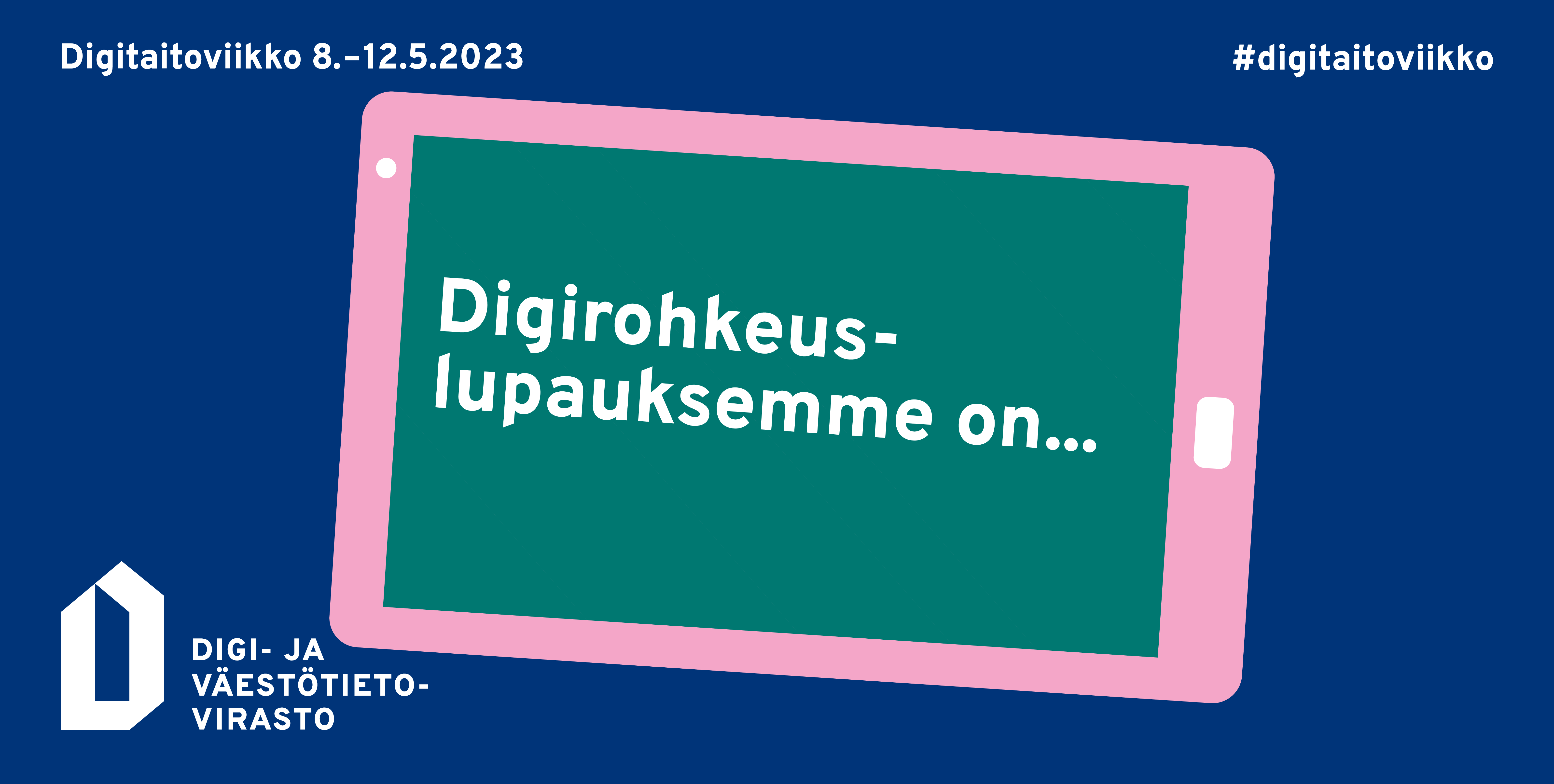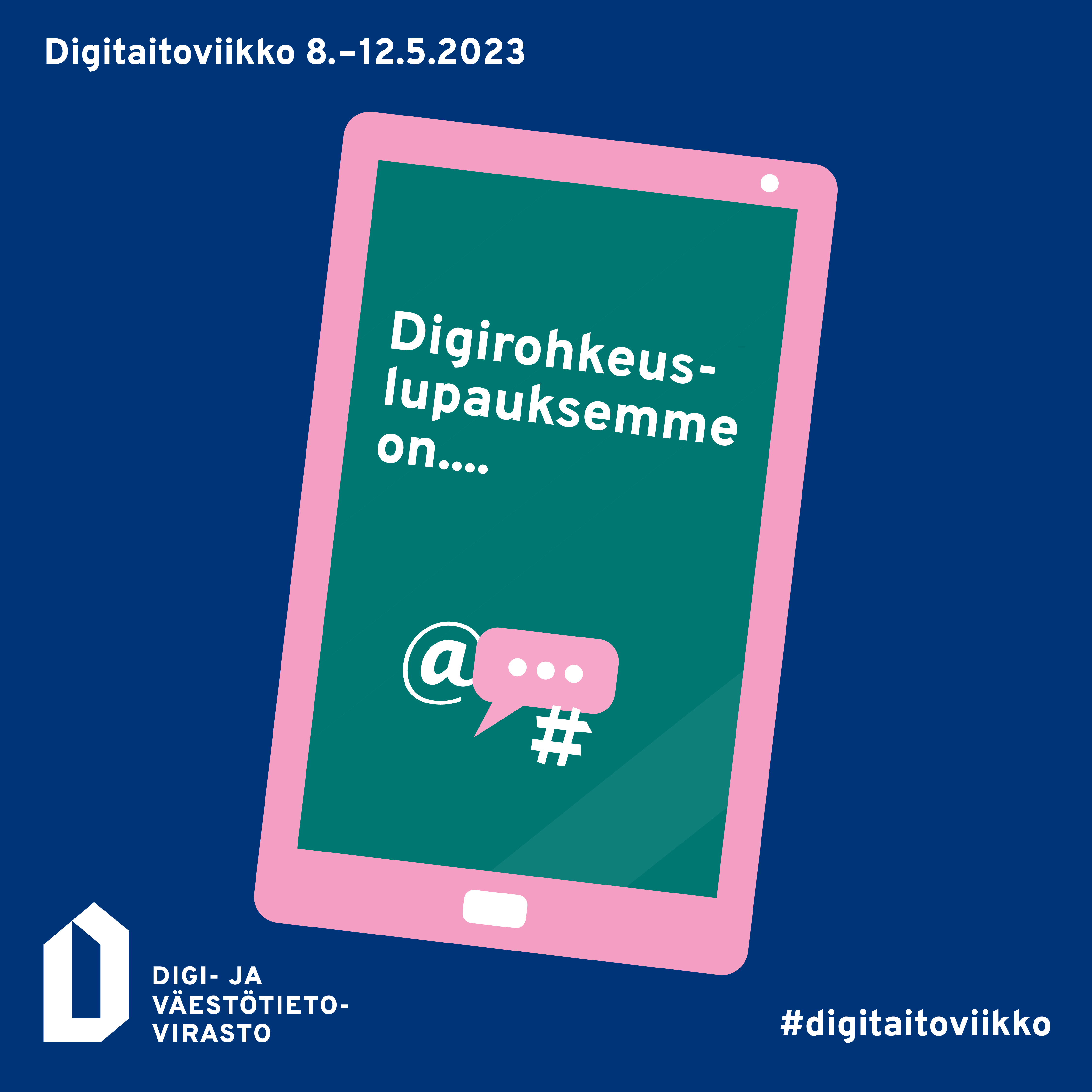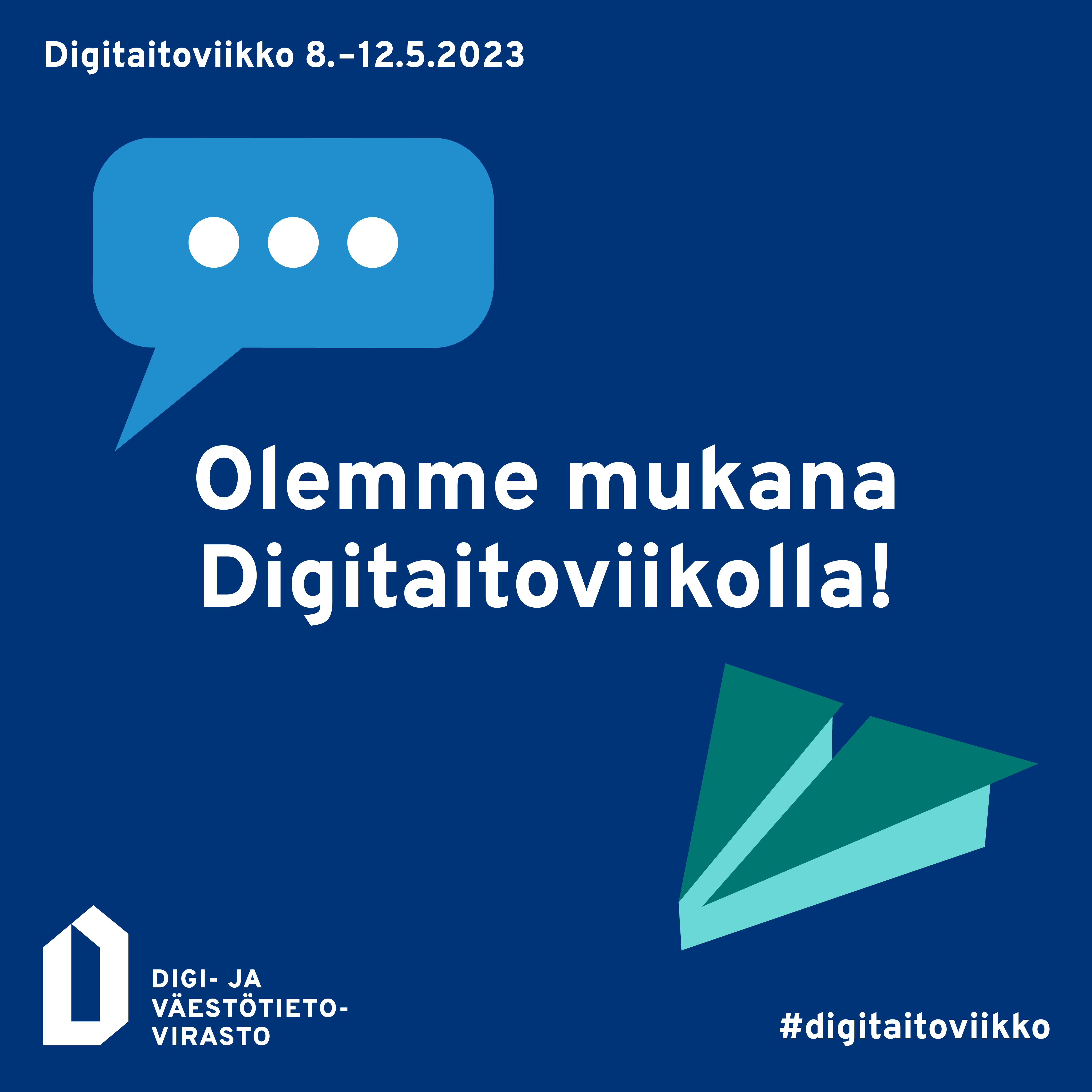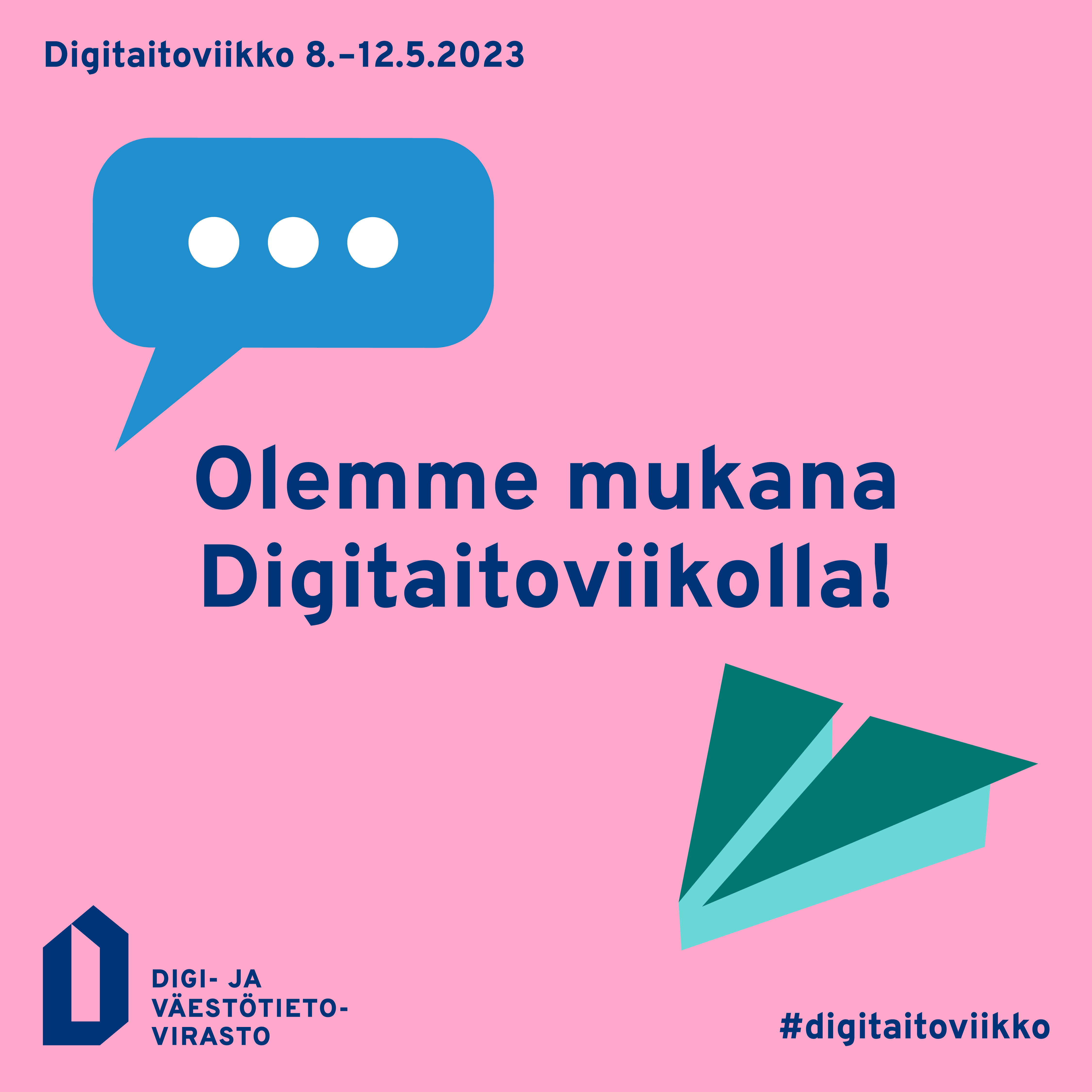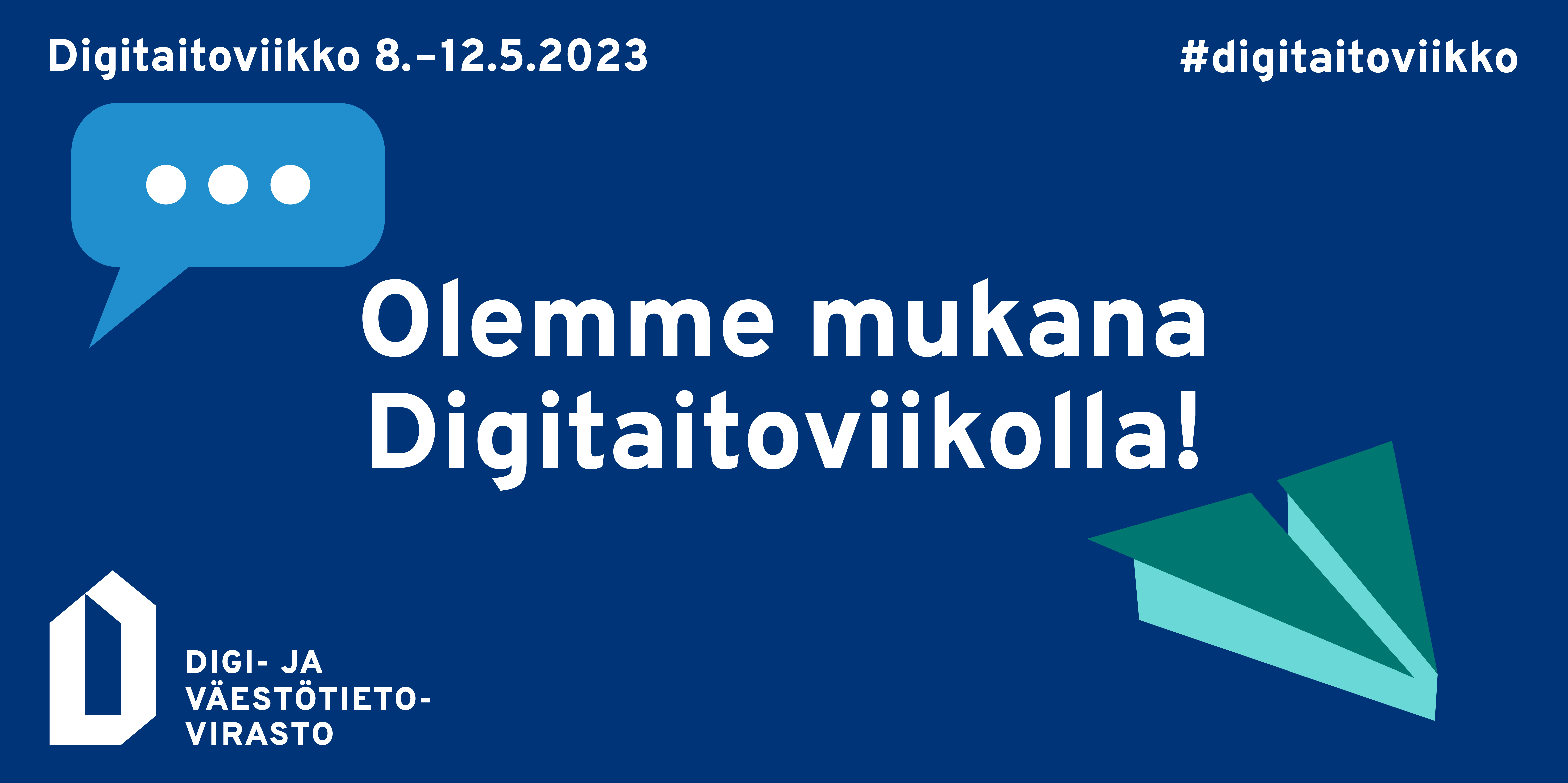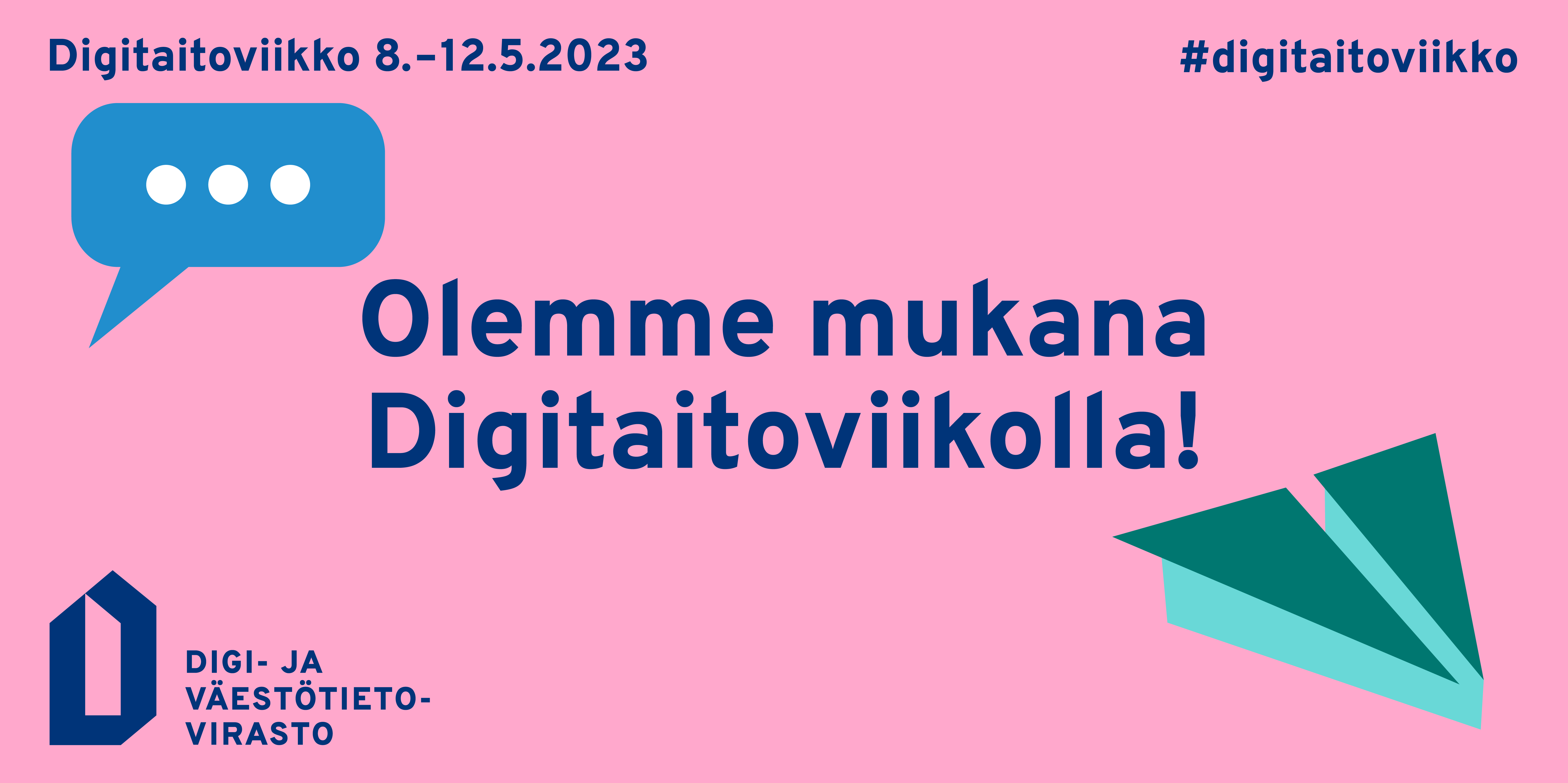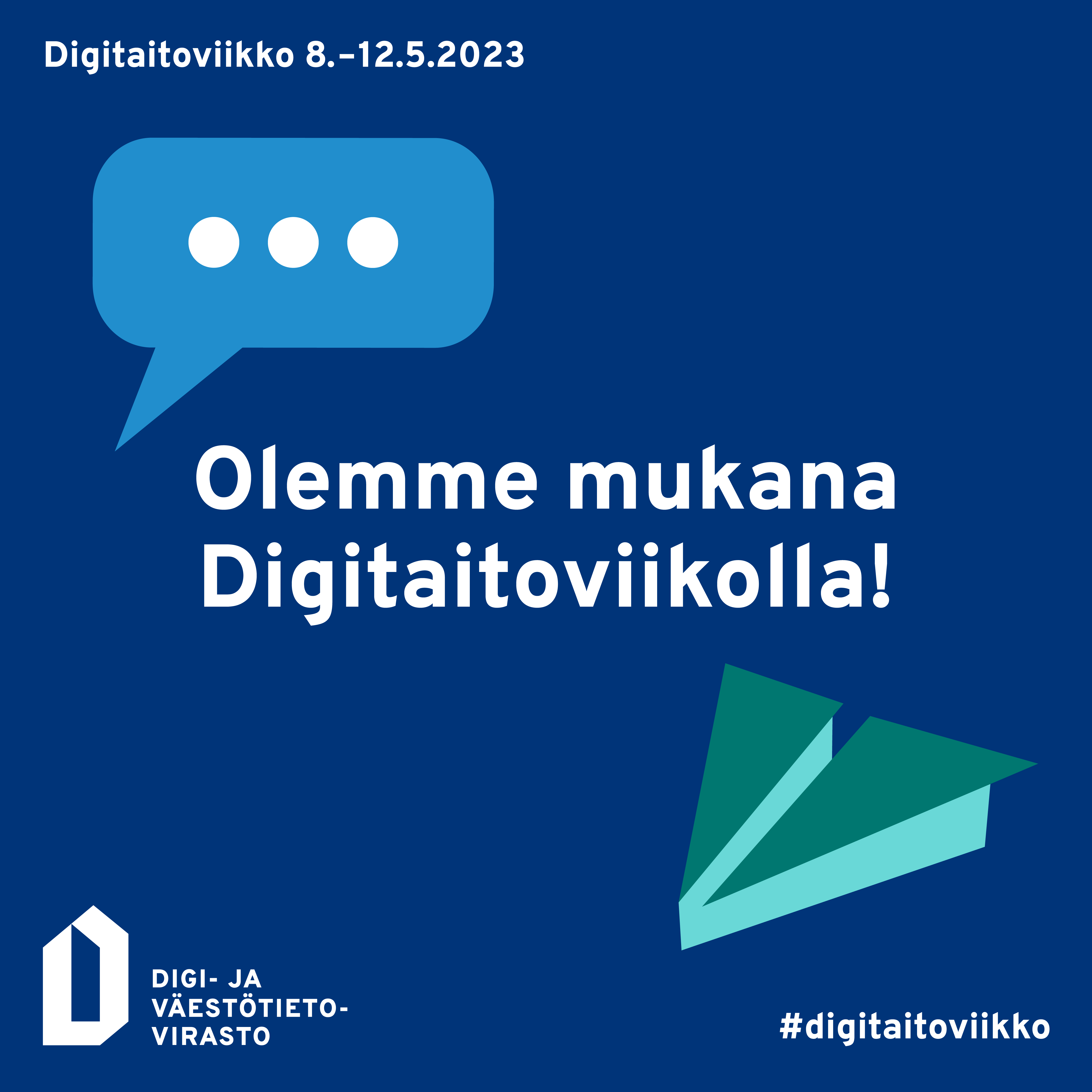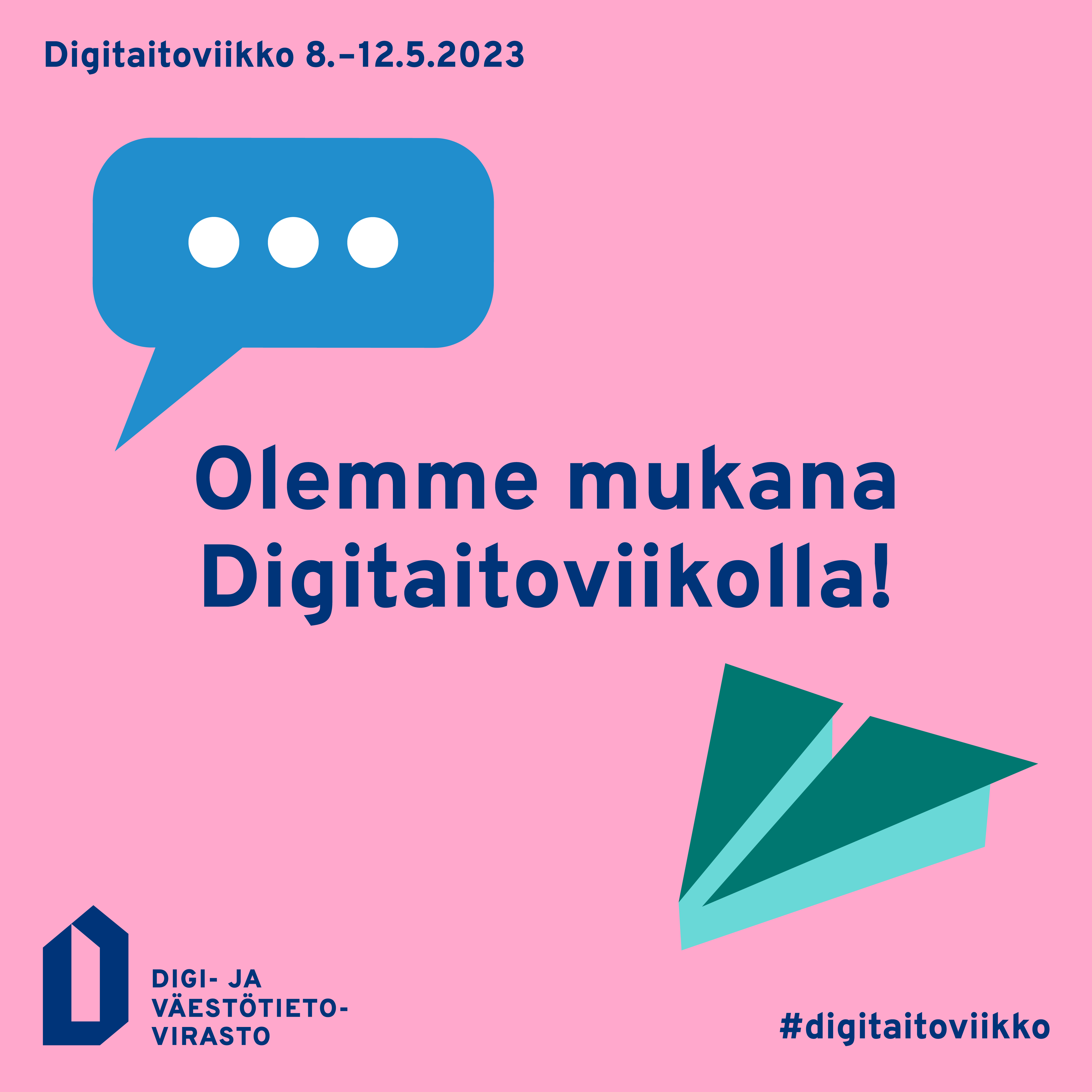Welcome to the Digital Skills Week 8-12 May 2023: Digital courage through collaboration between organisations and people
During Digital Skills Week, we will discuss how we all can contribute to building a digitally courageous Finland and our own digital everyday lives. This can only be achieved through collaboration between organisations and people.
Participation is free and open to all those interested.
You can watch the recordings from the digital skills week with Finnish and Swedish subtitles at
https://www.mediaserver.fi/live/digitaitoviikko2023
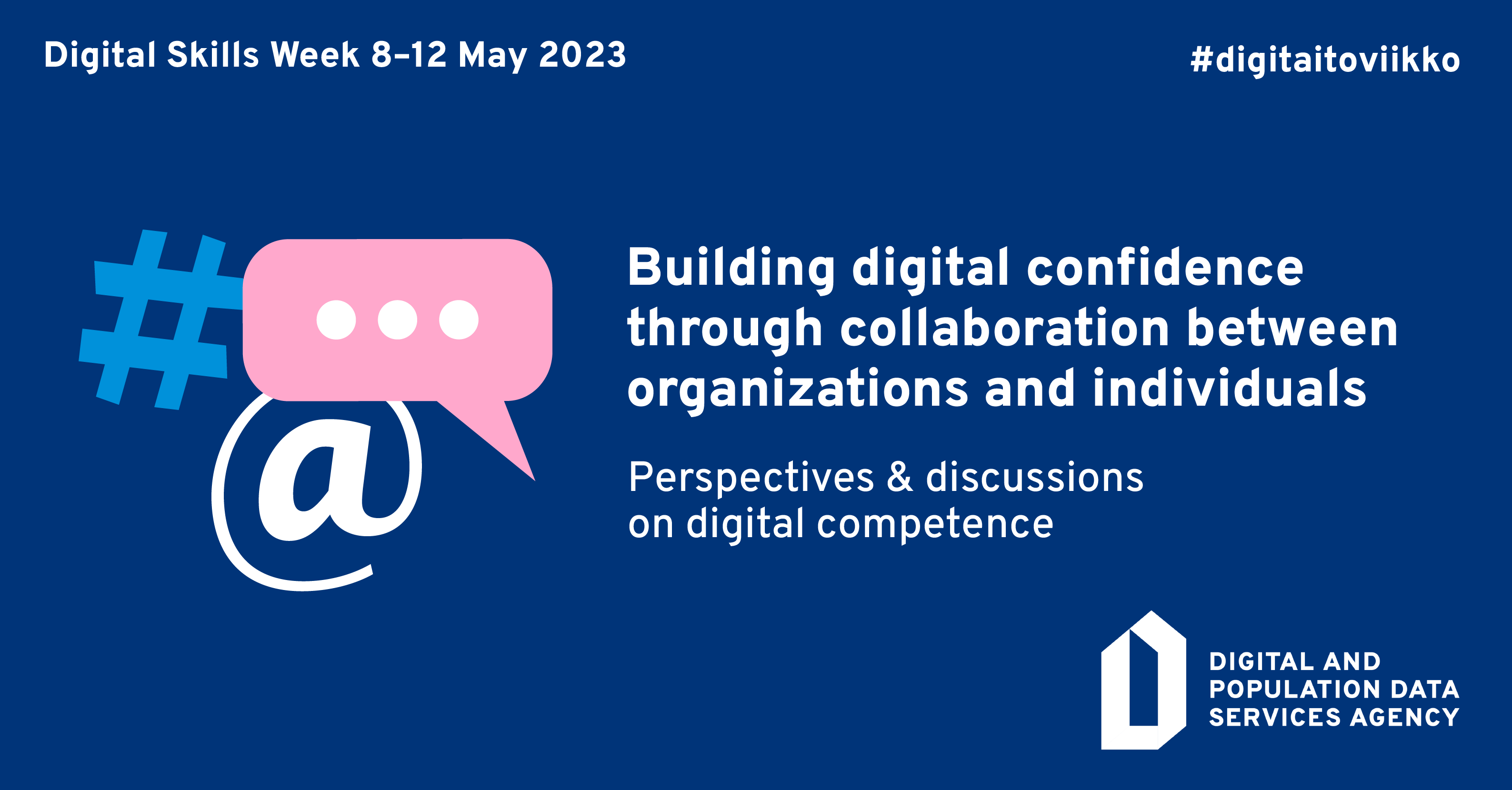
Programme
Monday 8 May 2023
Digital courage is a prerequisite for a democratic society
Program in Finnish
(Subtitles in Finnish and Swedish.)
Discussions in general:
- Five themes were discussed.
- There were a total of 95 participants in the discussions.
- The discussions were organised collaboratively.
Discussion: Digital knowledge safeguards democracy
The discussion was organised as part of the Bildung Week in cooperation with the Citizens' Forum.
- In order to involve education and the defence of democracy in digital skills, values are also involved. Many anti-democratic forces have high digital skills. It does not guarantee democracy; on the contrary, they manage to propagate their case extensively with good digital skills.
- We need more courage to defend our values in the digital world. On the other hand, we also need the courage to challenge our own prejudices to not separate our world views.
- The impacts of democracy education also extend to the digital world. More democracy education would be needed. We should be able to lower the threshold for joining the debate.
Discussion: Digital support for older people and using services on their behalf
- Preparing for deteriorating functional capacity is important for people of all ages. For example, making a continuing power of attorney in advance saves from worries, such as challenges related to unofficial acting on behalf of another party, later on. In addition, the documents produced for the continuing power of attorney are not written in stone. You can always change the contents and persons of the power of attorney once they have been prepared in advance!
- The importance of digital support in the transition phase. Many employers do not consider it important to invest in the development of the digital competence of employees who will retire within a few years. However, this would be important, as the employee also needs digital skills after the end of working life. Some also continue to work even after retirement. The elderly are a diverse group! Some are left out of the digital system and it would be important to identify the reasons for this. And when digital support is provided, it would be important to provide it at the pace of the elderly, in an understanding manner.
- Older people are too rarely involved in developing services. This should be addressed by service providers.
Discussion: Digital autonomy and self-determination of individuals
The discussion was organised in cooperation with Sitra.
- The transparency of algorithms should be increased. The algorithms on both the private and the public side remain unknown. It is difficult to strengthen trust in algorithms if the operating logic of algorithms cannot be understood. Dark algorithms undermine the right to self-determination.
- Understanding of privacy in the digital world, for example, is increasing. This is already reflected in people's behaviour in the digital environment.
- Not all digital services are the same. It is a different thing to submit a tax return than use a social media platform or a search engine. Do we sufficiently recognise the differences between different digital services, for example from the perspective of trust?
Discussion: Working-age people (25-64 years)
- The perception of oneself as a learner affects learning motivation. Not mastering all digital skills is not due to a lack of learning ability. Often people have negative perceptions of themselves as learners and they prevent people from seeking learning situations. We need to increase learning positiveness!
- For those in working life, the organisation's digital competence and enabling learning are important. Learning new digital skills in small bits, peer learning and the opportunities offered by the supervisor to develop digital skills strengthen the digital competence of those in working life.
- Everyone's competence must be brought up. Digital competence is diverse and it is important to identify it at both the individual and the organisation levels. Making competence visible encourages people to further develop their competence.
Discussion: Young people and young adults becoming independent (-24 years)
- Young people must be encountered in services empathetically and encouragingly. Let's give the young person the time needed to deal with their affairs without the sense of urgency. Adults should therefore have the sensitivity to identify the backgrounds and resources that young people have in using digital things.
- It is important to provide different service channels. For example, it may be easier for some people to use the chat instead of using their own voice and name. For others, written transactions may be challenging.
- The reason is not always the young person's motivation, but challenges related to services and using them. Planning of services should thus be carried out using service design so that young people are involved in the planning. It is important to take into account all kinds of young people, not the most active ones.
Discussion themes:
Young people and young adults becoming independent
- The transition of young people and young adults to independence is not seamless, as official processes and systems are often foreign to them. How could we strengthen the digital courage of young people and young adults who are becoming independent? Marika Tähti (Digital and Population Data Services Agency) will act as the scribe in the discussion.
Working-age people becoming digitally courageous
- Many working-age people feel that their digital competence does not stay up to date. Self-confidence with digitalisation often begins to decline at the age of 45. How could the digital courage of working-age people be strengthened? Mirva Gullman (Digital and Population Data Services Agency) will act as the scribe in the discussion.
Older people
- Many older people receive support in digital matters. But what if providing support is not enough? When you can or should act on behalf of an older person instead of supporting them and how should it be done? Henriikka Eloluoto (Digital and Population Data Services Agency) will act as the scribe in the discussion.
Digital knowledge safeguards democracy
- Democracy depends on the ability to act responsibly in a digital environment. What kind of skills and knowledge we should have to make this possible? Anna Kirstinä and Maiju Hirviniemi (Citizens’ Forum) will act as the scribes in the discussion.
Impact of digitalisation on the right to self-determination, agency and inclusion
- The discussion focuses on issues such as individuals’ current state of digital autonomy and its direct impact on democracy as well as the opportunities to improve inclusion brought on by digitalisation. Tiina Härkönen and Rosa-Maria Mäkelä (Sitra) will act as the scribes in the discussion.
Wednesday 10 May 2023
Working life success in the digital age comes through courage
The program in Finnish
(Subtitles in Finnish and Swedish.)
Discussions in general:
- Four themes were discussed.
- There were a total of 44 participants in the discussions
- The discussions were organised collaboratively.
Digital competence acquired for work
- Digital competence collected as a “civilian” also feeds working life competence – it is not always recognised when you are actually practising the skills needed in your work
- The contents of the work have changed and are constantly changing, but the digital skills required for them are not sufficiently highlighted. The organisations should identify the digital skills required in their work tasks. After this, e.g. development discussions could jointly identify which skills need to be improved, plan how competence can be achieved, and reserve time for it.
- Different learning challenges may also be obstacles to learning. Everyone needs the opportunity to learn at their own level (simplified language, aids, etc.)
Digital competence accumulated at work
- The use of digital tools and skills is a natural part of the work. Competence has often developed over a long period of time and one's own digital competence is not fully recognised.
- "They do who know how to. “ Digitally skilled colleagues sometimes take care of things for people with weaker digital skills. The organisations need space and a systematic approach to learning new skills and developing each employee's competence.
- Sharing competence and identifying strengths in the work community is important. Concrete models for supporting digital skills in work communities have been created with the help of digital mentors or other employees motivated by digital issues.
Digital competence of persons outside working life
The discussion was organised in cooperation with Etelä-Suomen Klubitalot ESKOT ry.
- Learning digital skills may have a high threshold if the skills are not immediately and visibly useful. For example, learning the digital skills needed at work during leisure time and while looking for a job may not feel motivating, as you won’t start using the skills immediately. Unused skills are also quickly forgotten. It may also be difficult to identify what the level of your digital competence is and what kinds of skills still need practise.
- Not everyone has their own device, as the economic situation of many people outside working life may be weak. Safe and quiet places for managing one's own affairs should be offered more extensively. For example, you cannot take part in a remote physician's appointment or job interview from the library lobby.
- People outside of the working life are a diverse group. The reason for being out of work may be age, health or a life event. Not all people outside working life have no digital skills. Some may be very digitally skilled, but e.g. the lack of Finnish-language competence prevents the use of Finnish-language digital services. For example, there would be demand for English-language job-seeking courses aimed at those with a higher level of education.
Reccogition of digital competence
The discussion was organised in cooperation with the Finnish National Agency for Education.
- Digital badges are a good way to recognise and acknowledge competence. They are already widely utilised and the feedback received on them has been positive.
- There is a lot of digital competence at workplaces, but it has not been made visible. Recognising it and creating a culture of learning in the work community could promote the development of personnel competence. Peer support and different forms of learning should also be taken into account.
- In the development of digital skills and digital courage, faith in one's own skills and learner identity may be an obstacle. Identifying existing competence could have a positive impact on this.
Keskustelujen teemat
- Työssä kertyvä digiosaaminen
- Valtaosa työssä tarvittavasta osaamisesta kertyy työssä, työtä tekemällä. Miten voimme tukea tekemällä oppimista ja itsenäistä uuden opettelua? Miten voimme tehdä työssä kertyneen osaamisen näkyväksi? Keskustelun kirjurina Mika Lillman, Digi- ja väestötietovirasto
- Valtaosa työssä tarvittavasta osaamisesta kertyy työssä, työtä tekemällä. Miten voimme tukea tekemällä oppimista ja itsenäistä uuden opettelua? Miten voimme tehdä työssä kertyneen osaamisen näkyväksi? Keskustelun kirjurina Mika Lillman, Digi- ja väestötietovirasto
- Työtä varten hankittu digiosaaminen
- Suomalaiset ovat kouluttautumismyönteistä kansaa, ja osallistuvat mielellään opintoihin, koulutuksiin ja kursseille - joskus intoa olisikin enemmän kuin mahdollisuuksia. Millaisia esteitä opiskelulle voi tulla vastaan? Miten voimme näitä esteitä selättää? Keskustelun kirjurina Marika Tähti, Digi- ja väestötietovirasto
- Suomalaiset ovat kouluttautumismyönteistä kansaa, ja osallistuvat mielellään opintoihin, koulutuksiin ja kursseille - joskus intoa olisikin enemmän kuin mahdollisuuksia. Millaisia esteitä opiskelulle voi tulla vastaan? Miten voimme näitä esteitä selättää? Keskustelun kirjurina Marika Tähti, Digi- ja väestötietovirasto
- Työelämän ulkopuolella olevien henkilöiden digiosaaminen
- Digitalisaatio etenee vauhdilla, ja työelämään kohdistuu myös muita perustavanlaisia muutoksia. Miten voimme varmistaa, että työelämän ulkopuolelle jääneiden osaaminen pysyy työelämän tarpeiden tasalla? Keskustelun kirjurina Anette Puolakka, Etelä-Suomen Klubitalot ESKOT ry
- Digitalisaatio etenee vauhdilla, ja työelämään kohdistuu myös muita perustavanlaisia muutoksia. Miten voimme varmistaa, että työelämän ulkopuolelle jääneiden osaaminen pysyy työelämän tarpeiden tasalla? Keskustelun kirjurina Anette Puolakka, Etelä-Suomen Klubitalot ESKOT ry
- Digiosaamisen tunnistaminen ja tunnustaminen
- Digiosaaminen on moninainen kokonaisuus, jota on vaikea tunnistaa ja mitata. Jotta osaamista voidaan kehittää, olisi kuitenkin hyvä pystyä kartoittamaan osaamisen nykytilaa. Miten voimme tunnistaa ja tunnustaa työikäisten digiosaamisen tasoa? Keskustelun kirjurina Marja Juhola, Opetushallitus
- Digiosaaminen on moninainen kokonaisuus, jota on vaikea tunnistaa ja mitata. Jotta osaamista voidaan kehittää, olisi kuitenkin hyvä pystyä kartoittamaan osaamisen nykytilaa. Miten voimme tunnistaa ja tunnustaa työikäisten digiosaamisen tasoa? Keskustelun kirjurina Marja Juhola, Opetushallitus
Keskustelun periaatteet
- Samaan aikaan on käynnissä neljä eri keskusteluryhmää. Jokainen ryhmä toimii omassa Teamsissa.
- Jokaisessa ryhmässä on valmiina paikalla kirjuri keskustelun ydinkohtien kirjaamista varten. Kirjuri kirjaa keskustelun ydinkohdat Miro-työskentelyseinälle kaikkien nähtäville.
- Keskustelut alkavat kello 13 ja päättyvät viimeistään kello 14.
- Voit valita vapaasti mihin ryhmään tai ryhmiin osallistut.
- Voit halutessasi osallistua keskusteluun tai tulla vain kuuntelemaan.
- Voit halutessasi vaihtaa ryhmää, vaikka keskustelut ovat käynnissä.
Kaikki paikallaolijat ovat oikeita henkilöitä osallistumaan keskusteluun, sillä kiinnostus osallistua on osoitus siitä, että asia on tärkeä.
Keskustelun havaintojen läpikäynti
- Pääset lukemaan oman ja muiden ryhmien tekemiä muistiinpanoja suoraan Miro-taululla.
- Jokaisen ryhmän keskustelun pääkohdat kootaan kirjalliseen koosteeseen, joka julkaistaan dvv.fi/digituki -sivustolla.
Friday 12 May 2023 (hybrid event)
Digital first, but not alone
Program in Finnish
(Subtitles in Finnish and Swedish.)
Use the Participation in the Digital Skills Week and digital courage pictures!
The organisations participating in the Digital Skills Week can use our ready-made social media and website banners in their communications.
You can download the banners below.
We are participating in the Digital Skills Week
You can view and download channel-specific versions of the images below.
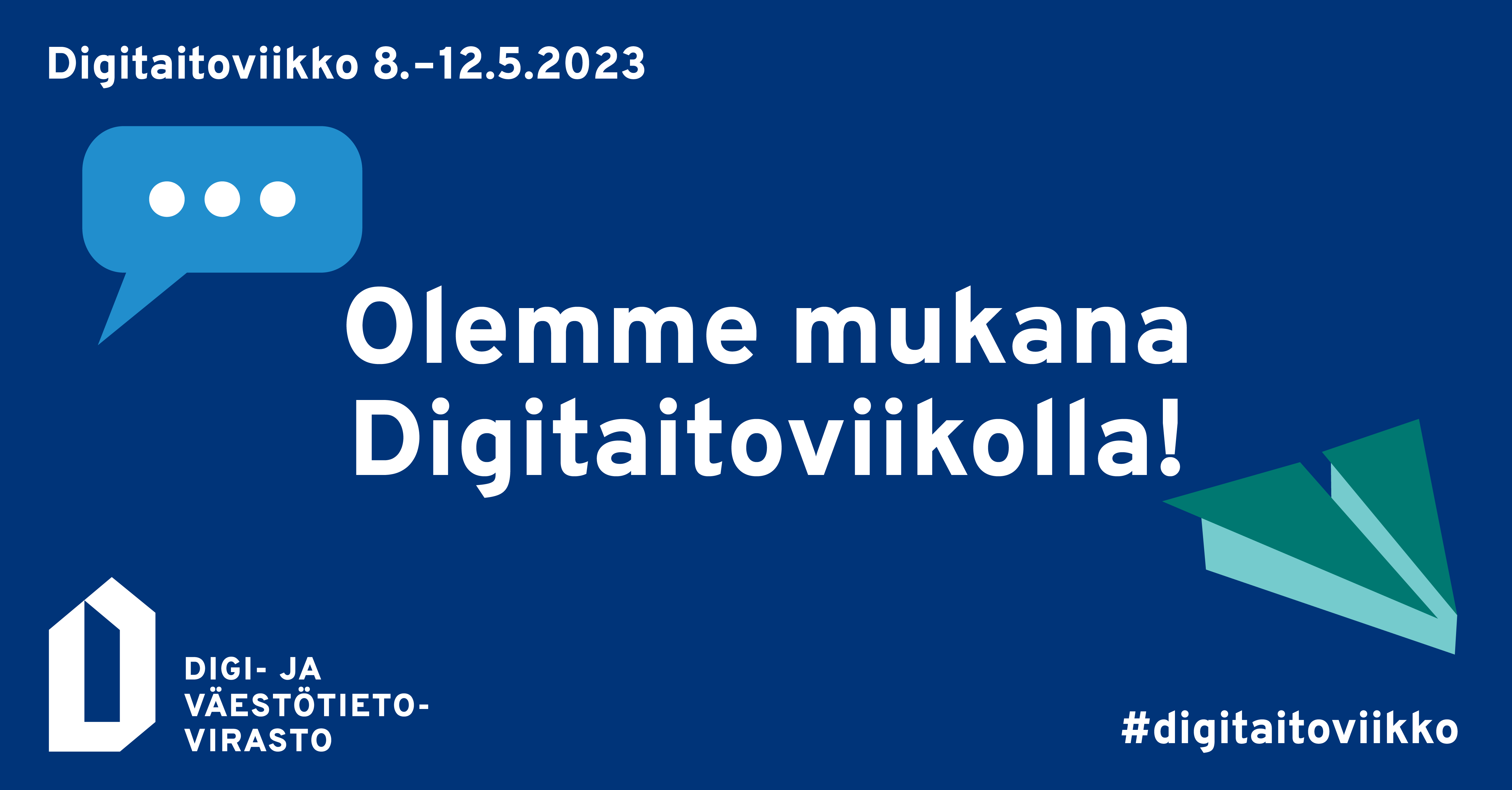
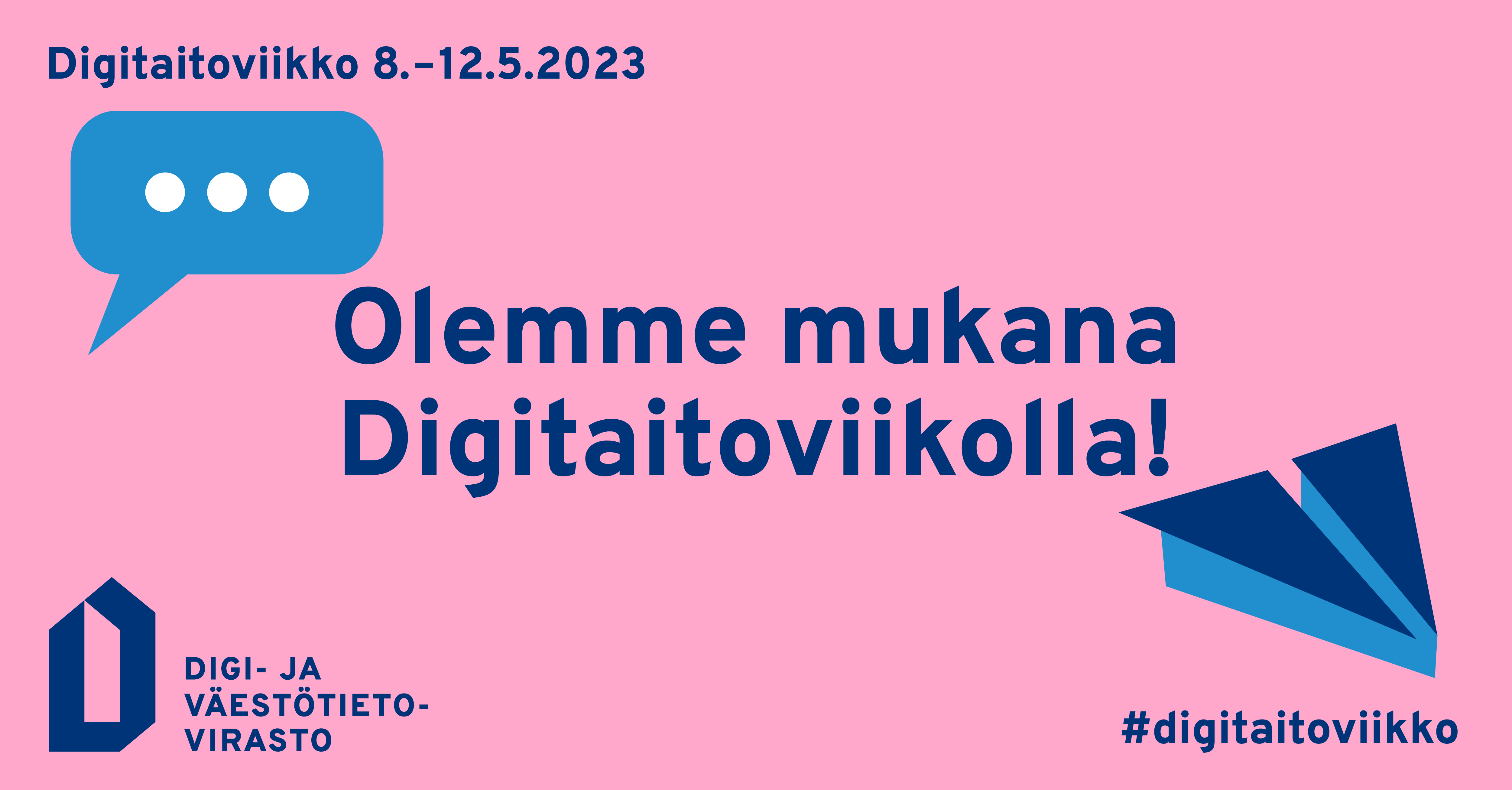
Digital Skills Week is an annually organised theme week on digital competence. The aim of the week is to pay attention to the current and changing themes of digital competence.
- Individuals
- Moving
- Check your own personal details
- Certificates from the Population Information System
- Names
- Guardianship
- Having or adopting a child
- Marriage
- Death and estate inventory
- Life changes while living abroad
- Moving while living abroad
- Registration of a child born abroad
- Marriage concluded abroad
- Partnership registered abroad
- Divorce granted abroad
- Registration of a name change performed abroad
- Death abroad
- Registration of citizenship
- Loss of citizenship of another country
- Notification of retaining Finnish citizenship
- Legalisation of foreign documents
- Submitting foreign documents
- As a foreigner in Finland
- Registration of a foreigner
- Guide for students
- Municipality of residence
- Family relationships and Marital Status
- Instructions on arriving in Finland from Ukraine
- Guide for employed persons
- Fast track service for specialists and growth entrepreneurs
- Instructions for legalisation
- Submitting foreign documents
- Foreigner’s move to Finland, in Finland and out of Finland
- Services of notary public
- Confirmation of gender
- Population information in the Population Information System
- Elections and Right to vote
- Certification of purchase
- Registration of a gift notification
- Citizen Certificate and electronic identity
- Organisations
- Certificates, cards, seals and stamps
- For social welfare and healthcare service providers
- For organisations
- Electronic sealing service
- Timestamping Service
- Electronic signature
- Service certificates
- Advisory service, support and revocation service
- Certificate Directory
- Test the use of a certificate
- Card Reader Software
- Information about certificates
- Population information services for organisations
- Public administration sampling and updating service
- Private sector sampling and updating services
- PIS modified data interface
- Modified data update service
- Population Information System query interface
- Browser-based Population Information System query
- Resident selection service
- Selection service for municipalities
- Reform of personal identity code
- Conditions for using population information
- Selection service for wellbeing services counties
- Maintaining the Population Information System
- Extracts from registers
- Suomi.fi services
- Services to promote digitalisation
- Digital support
- Digital security services
- Services of notary public
- Certification of purchase
- Right to officiate weddings
- E-services
- Finnish Authenticator identification service
- Certificates, cards, seals and stamps
- About the agency
- Digital and Population Data Services Agency
- Digital and Population Data Services Agency as an Employer
- Use our services electronically
- News
- Contact
- Customer service for private customers
- Customer service for organisations
- Service locations
- Digital and Population Data Services Agency address, switchboard e-billing details
- Digital and Population Data Services Agency Management
- Marriage ceremony premises information
- Contact details for media
- International Affairs
- Invoicing
- Quality policy
- Equality plan for customers
- Data protection
- Population Information System
- For media
- Brochures and publications
- Projects
- Foresight and research cooperation

